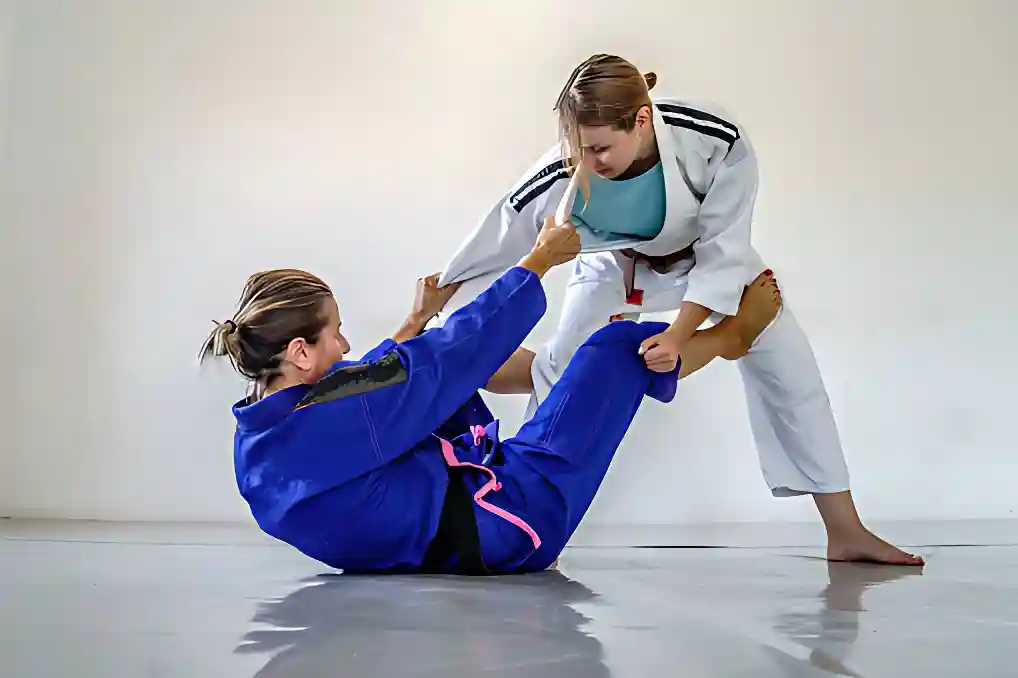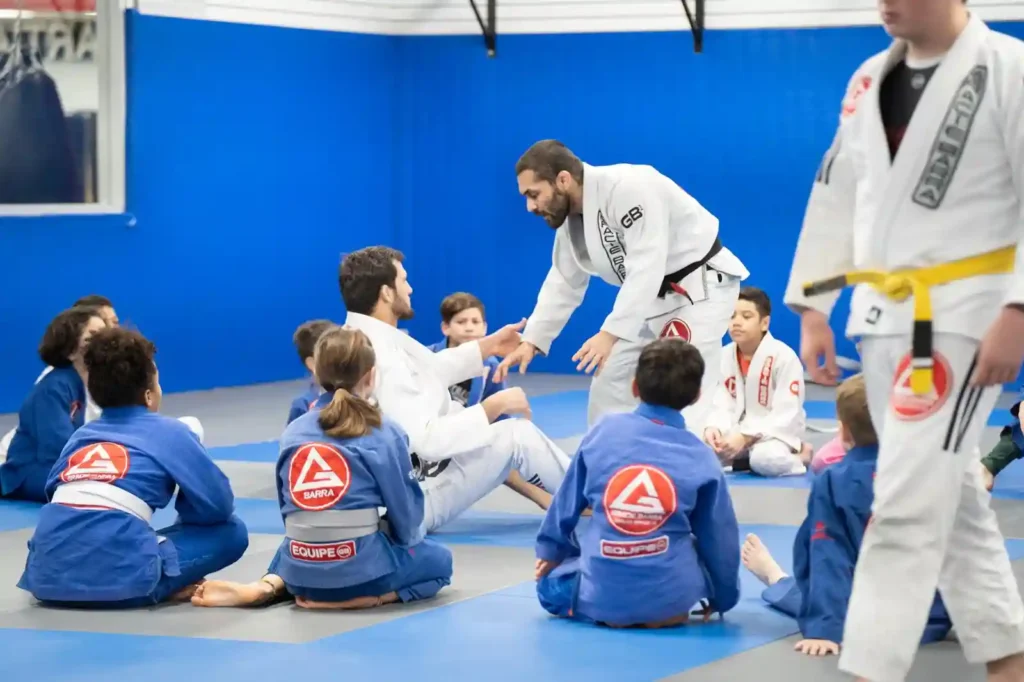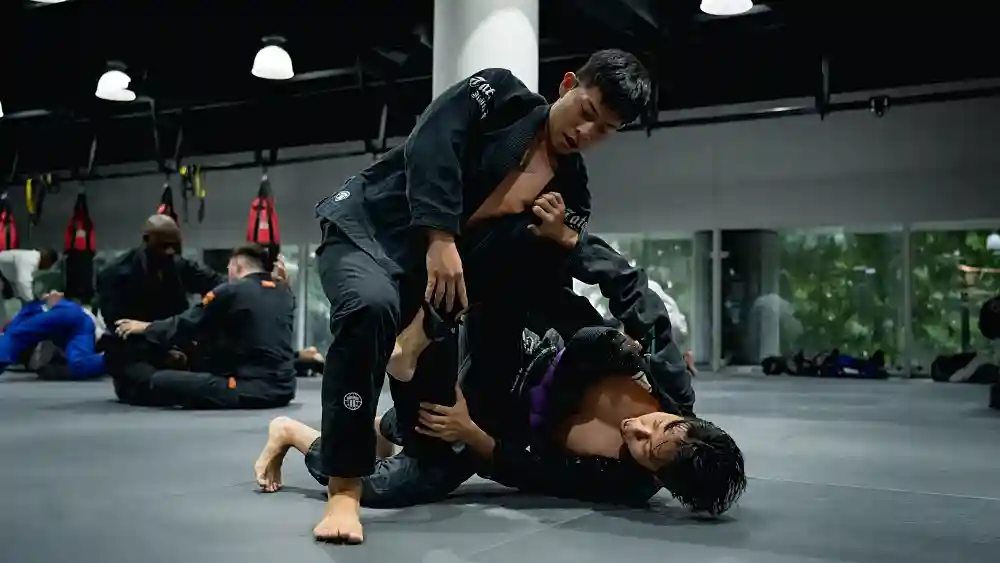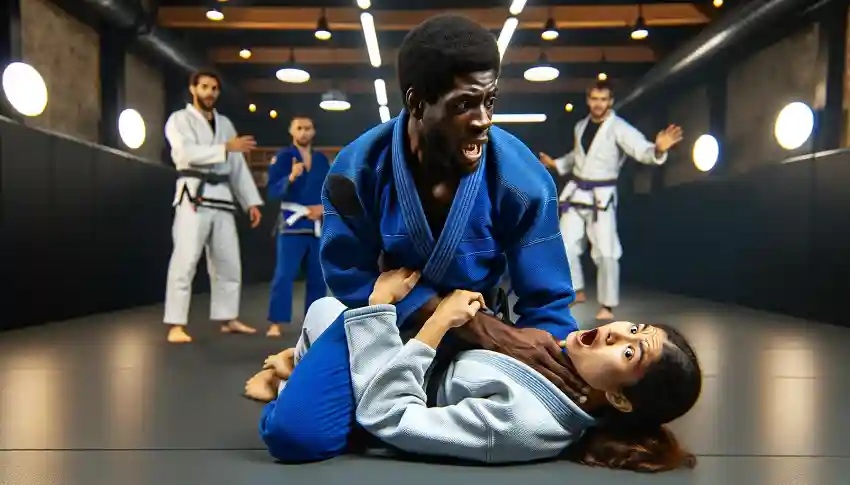Is BJJ good for self-defense? how Brazilian Jiu-Jitsu (BJJ) works in real-world situations. We’ll examine its strengths, limitations, and why many consider it one of the most effective martial arts for personal protection.
What is Brazilian Jiu-Jitsu?

Brazilian Jiu-Jitsu is a ground-based martial art that focuses on grappling and submission techniques. It evolved from traditional Japanese jujutsu and judo in Brazil during the early 20th century. The Gracie family developed and refined these techniques, creating what we know today as BJJ.
Key characteristics of BJJ include:
- Ground fighting emphasis
- Leverage-based techniques
- Submission holds and chokes
- Joint manipulation and locks
- Position control and dominance
The Foundation of BJJ’s Self-Defense Effectiveness

Understanding Is BJJ good for self-defense the Effectiveness of Brazilian Jiu-Jitsu requires examining its core principles. BJJ operates on several fundamental concepts that make it particularly suitable for self-defense situations.
Leverage Over Strength
BJJ teaches practitioners to use leverage and technique rather than brute force. This approach offers several advantages:
- Smaller individuals can defend against larger attackers
- Techniques work regardless of physical strength differences
- Energy conservation during confrontations
- Reduced reliance on natural athletic ability
- Effective for all age groups and fitness levels
Ground Fighting Mastery
Most real-world altercations end up on the ground. BJJ specializes in this area where many other martial arts fall short:
- Superior positioning control
- Ability to fight effectively from the bottom
- Knowledge of guard positions and escapes
- Understanding of weight distribution
- Comfort in close-contact situations
Real-World Applications of BJJ

When examining Is BJJ good for self-defense the Effectiveness of Brazilian Jiu-Jitsu, real-world scenarios provide the best evidence. BJJ techniques translate effectively to self-defense situations in several ways.
Control Without Excessive Harm
One of BJJ’s greatest strengths is its ability to control situations without causing permanent damage:
- Restraining techniques that don’t require striking
- Options to subdue rather than injure
- De-escalation through positional control
- Ability to hold someone until help arrives
- Legal advantages in self-defense situations
Dealing with Common Attack Scenarios
BJJ addresses many common self-defense situations:
- Bear hugs from behind
- Being pushed against walls
- Ground attacks and mounting
- Choke attempts from attackers
- Multiple grabbing scenarios
Escape and Evasion Techniques
BJJ teaches crucial escape methods:
- Breaking free from grabs and holds
- Getting back to feet quickly
- Creating distance from attackers
- Defensive positioning strategies
- Exit strategies from dangerous situations
Scientific Evidence Supporting BJJ’s Effectiveness
Research supports the effectiveness of Brazilian Jiu-Jitsu for self-defense applications. Studies show that BJJ training provides measurable benefits for personal protection.
Physical Benefits
BJJ training develops specific physical attributes crucial for self-defense:
- Improved flexibility and mobility
- Enhanced grip strength and endurance
- Better body awareness and balance
- Increased cardiovascular fitness
- Functional strength development
Mental and Psychological Benefits
The mental aspects of BJJ training are equally important for self-defense:
- Increased confidence in dangerous situations
- Reduced anxiety and panic responses
- Better decision-making under pressure
- Improved stress management
- Enhanced situational awareness
BJJ vs. Other Martial Arts for Self-Defense
When considering Is BJJ good for self-defense the Effectiveness of Brazilian Jiu-Jitsu, it’s helpful to compare it with other martial arts.
BJJ vs. Striking Arts (Boxing, Karate, Muay Thai)
offers distinct advantages over striking-based martial arts:
- Works in confined spaces
- Effective when striking isn’t possible
- Less dependent on speed and timing
- Better for controlling situations
- Reduced risk of injury to defender
BJJ vs. Wrestling
While wrestling provides excellent takedown skills, BJJ offers more complete ground fighting:
- Submission techniques for ending fights
- Guard positions for defensive fighting
- More diverse ground game options
- Better suited for one-on-one encounters
- Focus on leverage over athleticism
BJJ vs. Traditional Martial Arts
Compared to traditional martial arts, BJJ provides more practical applications:
- Techniques tested in live sparring
- Realistic training environment
- Proven effectiveness in competition
- Continuous evolution and improvement
- Less reliance on forms and kata
The UFC Connection: Proof of BJJ’s Combat Effectiveness
The Ultimate Fighting Championship (UFC) provides compelling evidence for Is BJJ good for self-defense the Effectiveness of Brazilian Jiu-Jitsu. The early UFC events demonstrated BJJ’s superiority over other martial arts in one-on-one combat situations.
Early UFC Dominance
Royce Gracie’s success in the early UFC events proved BJJ’s effectiveness:
- Won UFC 1, 2, and 4 tournaments
- Defeated much larger opponents
- Demonstrated technique over size and strength
- Changed the landscape of martial arts
- Inspired worldwide BJJ adoption
Modern MMA Integration
Today’s UFC fighters universally train BJJ:
- Essential component of mixed martial arts
- Nearly all champions have BJJ backgrounds
- Ground game proficiency is mandatory
- Submission skills are crucial for success
- Defensive grappling prevents losses
Statistical Evidence from Professional Fighting
UFC statistics support BJJ’s effectiveness:
- High percentage of fights end in submissions
- Ground control leads to victory
- BJJ specialists maintain long careers
- Technical victories over athletic opponents
- Consistent performance across weight classes
Limitations of BJJ in Self-Defense
While exploring Is BJJ good for self-defense the Effectiveness of Brazilian Jiu-Jitsu, it’s important to acknowledge its limitations.
Multiple Attacker Scenarios
BJJ faces challenges in multiple attacker situations:
- Designed primarily for one-on-one combat
- Ground fighting exposes defender to additional attackers
- Less effective against armed multiple opponents
- Requires modification for group scenarios
- May need supplementation with other skills
Weapon Defense Limitations
BJJ has limitations against armed attackers:
- Techniques not specifically designed for weapons
- Close contact increases weapon threat
- Traditional BJJ doesn’t emphasize weapon disarms
- Requires additional specialized training
- May not be optimal first choice against armed opponents
Stand-Up Fighting Gaps
Pure BJJ practitioners may lack certain skills:
- Limited striking techniques
- Takedown defense from wrestling
- Stand-up clinch work
- Distance management
- Initial engagement strategies
Training Considerations for Self-Defense BJJ
To maximize Is BJJ good for self-defense the Effectiveness of Brazilian Jiu-Jitsu, specific training approaches are recommended.
Self-Defense Specific Training
BJJ training for self-defense should include:
- Scenario-based practice sessions
- Training in street clothes
- Emphasis on escape techniques
- Realistic environmental training
- Stress inoculation exercises
Physical Conditioning Requirements
Effective self-defense BJJ requires proper conditioning:
- Cardiovascular endurance development
- Functional strength training
- Flexibility and mobility work
- Grip strength improvement
- Recovery and injury prevention
Mental Preparation Components
Mental training aspects are crucial:
- Situational awareness development
- Conflict de-escalation skills
- Legal knowledge of self-defense
- Emotional control under pressure
- Decision-making in crisis situations
Who Benefits Most from BJJ Self-Defense Training?
Understanding Is BJJ good for self-defense the Effectiveness of Brazilian Jiu-Jitsu involves identifying who gains the most from this training.
Women and Self-Defense
BJJ offers particular advantages for women:
- Technique overcomes size disadvantages
- Effective against common attack patterns
- Builds confidence and assertiveness
- Provides realistic training scenarios
- Develops practical escape skills
Older Adults and BJJ
Mature practitioners benefit significantly:
- Low-impact training options
- Emphasis on technique over athleticism
- Scalable intensity levels
- Cognitive benefits from learning
- Social community aspects
Smaller Individuals
BJJ particularly benefits smaller people:
- Leverage-based techniques
- Guard positions for defensive fighting
- Submission skills end fights quickly
- Technical knowledge beats size
- Proven effectiveness against larger opponents
Time Investment and Skill Development
When considering Is BJJ good for self-defense the Effectiveness of Brazilian Jiu-Jitsu, understanding the time commitment is crucial.
Basic Proficiency Timeline
Developing fundamental BJJ skills requires:
- 6-12 months for basic techniques
- 1-2 years for intermediate proficiency
- 3-5 years for advanced applications
- Continuous learning throughout training
- Regular practice for skill retention
Essential Techniques to Master
Priority techniques for self-defense include:
- Basic escapes from common positions
- Fundamental submissions and chokes
- Guard positions and recovery
- Takedown defense basics
- Getting back to feet safely
Training Frequency Recommendations
Optimal training schedules vary:
- 2-3 sessions per week for beginners
- 4-5 sessions for faster progress
- Supplemental home practice
- Consistent attendance over intensity
- Long-term commitment mindset
Cost-Effectiveness of BJJ Training
Evaluating Is BJJ good for self-defense the Effectiveness of Brazilian Jiu-Jitsu includes considering the financial investment.
Initial Investment Requirements
Starting BJJ involves several costs:
- Monthly gym membership fees
- Basic training equipment (gi, rash guards)
- Initial private lessons for foundation
- Tournament fees for experience
- Ongoing seminar and workshop costs
Long-term Value Proposition
BJJ provides excellent long-term value:
- Skills develop over decades
- Health and fitness benefits
- Social community connections
- Stress relief and mental health
- Practical self-defense capabilities
Comparison with Other Self-Defense Options
BJJ compares favorably to alternatives:
- More comprehensive than short courses
- Better value than personal training
- Stronger community than solo training
- More practical than theoretical study
- Greater depth than basic self-defense classes
Integration with Other Self-Defense Skills
Understanding Is BJJ good for self-defense the Effectiveness of Brazilian Jiu-Jitsu involves seeing how it fits with other skills.
Complementary Martial Arts
BJJ works well with:
- Boxing for striking fundamentals
- Wrestling for takedown skills
- Judo for standing grappling
- Muay Thai for clinch work
- Krav Maga for weapon defense
Situational Awareness Training
BJJ should be combined with:
- Environmental awareness skills
- Threat assessment abilities
- De-escalation techniques
- Legal self-defense knowledge
- Emergency response preparation
Physical Fitness Integration
Complete self-defense preparation includes:
- Cardiovascular conditioning
- Strength training programs
- Flexibility and mobility work
- Injury prevention strategies
- Recovery and rest protocols
Common Misconceptions About BJJ and Self-Defense
Addressing Is BJJ good for self-defense the Effectiveness of Brazilian Jiu-Jitsu requires clearing up misconceptions.
“BJJ Only Works on the Ground”
This misconception ignores several facts:
- BJJ includes standing techniques
- Takedown defense is emphasized
- Clinch work is fundamental
- Many techniques work standing
- Ground fighting is often unavoidable
“BJJ Takes Too Long to Learn”
This belief overlooks important points:
- Basic techniques work immediately
- Principles apply from day one
- Continuous improvement over time
- Practical skills develop quickly
- Every class builds capability
“BJJ Doesn’t Work Against Larger Opponents”
Evidence contradicts this claim:
- Technique consistently beats size
- Leverage multiplies force effectively
- Smaller practitioners regularly succeed
- Competition results prove effectiveness
- Real-world applications demonstrate success
Legal Considerations in Self-Defense
When examining Is BJJ good for self-defense the Effectiveness of Brazilian Jiu-Jitsu, legal aspects are important.
Reasonable Force Principles
BJJ aligns well with legal requirements:
- Control techniques allow graduated responses
- Non-striking approaches reduce injury risk
- Restraining methods are legally defensible
- De-escalation becomes possible
- Evidence of reasonable force is clear
Documentation and Evidence
BJJ training provides legal advantages:
- Formal training demonstrates restraint
- Technique knowledge shows control
- Instructor certification validates training
- School records prove legitimate study
- Witness testimony supports claims
Liability and Insurance Considerations
Training considerations include:
- Insurance coverage for training
- Liability protection for instructors
- School insurance and waivers
- Personal injury considerations
- Legal consultation availability
The Future of BJJ in Self-Defense
Looking ahead, Is BJJ good for self-defense the Effectiveness of Brazilian Jiu-Jitsu continues to evolve.
Technological Integration
Modern developments include:
- Video analysis for technique improvement
- Apps for training scheduling
- Online instruction supplements
- Virtual reality training possibilities
- Wearable technology for performance tracking
Training Methodology Advances
BJJ instruction continues improving:
- Scientific approach to learning
- Accelerated learning techniques
- Specialized self-defense curricula
- Age-specific training programs
- Adaptive instruction methods
Growing Recognition and Acceptance
BJJ’s reputation continues expanding:
- Law enforcement adoption
- Military training integration
- School anti-bullying programs
- Corporate wellness initiatives
- Healthcare professional recognition
Conclusion
BJJ is highly effective for self-defense, offering proven techniques against larger opponents, realistic training, and control methods that minimize harm. However, it works best when supplemented with situational awareness, basic striking, and weapon defense knowledge. For those committed to regular training and seeking practical, technical approaches to personal protection, BJJ represents an excellent investment in safety and well-being.






